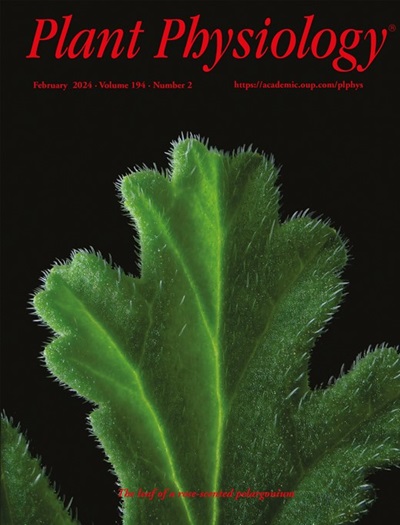水分胁迫通过不同机制促进野生型和转基因高叶油烟甘油三酯的积累
IF 6.5
1区 生物学
Q1 PLANT SCIENCES
引用次数: 0
摘要
为了满足对植物油日益增长的需求,人们开发了经过代谢工程改造的高叶油料植物。这些植物在受控条件下的产油量很有希望;然而,它们在非生物胁迫的类似田间条件下的表现仍不确定。在本研究中,野生型(WT)和高叶油(HLO)转基因烟草(Nicotiana tabacum)植物暴露于中度和持续的水胁迫下,以模拟田间条件。从生理、生化和转录水平研究了水分胁迫对生物量和脂质积累的影响。与 WT 植物相比,通过上调参与脂质生物合成的内源基因,转基因的存在增加了 HLO 植物叶片三酰甘油(TAG)的含量,但生物量却减少了,叶片脂质含量和轮廓发生了变化,膜脂的不饱和水平也降低了。此外,HLO 植物的生物量减少会降低冠层蒸腾作用,从而使其在水分有限的环境中表现更佳。此外,WT 和 HLO 植物在水分胁迫下的 TAG 积累增强,但机制不同。在 WT 植物中,水分胁迫诱导了脂质重塑,上调了编码磷脂酸磷酸酶(PAP)、二酰甘油邻酰转移酶(DGAT2)和脂滴相关蛋白(LDAP1)的基因,但下调了编码甘氨酰-天冬氨酸-亮氨酸(GDSL)脂肪酶的基因。相反,HLO 植物在水分胁迫下主要通过上调 OLEOSINS 和下调 GDSLs 来增加 TAG 积累。总之,适度的水胁迫促进了 HLO 植物的产油量,证明了 HLO 技术在缺水条件下田间可持续产油的稳健性。本文章由计算机程序翻译,如有差异,请以英文原文为准。
Water stress enhances triacylglycerol accumulation via different mechanisms in wild-type and transgenic high-leaf oil tobacco
Metabolically engineered high-leaf oil plants have been developed to meet the increasing demand for plant oils. Oil production of these plants under controlled conditions is promising; however, their performance under field-like conditions with abiotic stresses remains uncertain. In this study, wild-type (WT) and high-leaf oil (HLO) transgenic tobacco (Nicotiana tabacum) plants were exposed to moderate and sustained water stress to mimic field conditions. The effects of water stress on biomass and lipid accumulation were investigated at the physiological, biochemical, and transcriptional levels. The presence of transgenes increased leaf triacylglycerol (TAG) levels in HLO plants by upregulating endogenous genes involved in lipid biosynthesis at the expense of biomass reduction, altered leaf lipid content and profile, and a decrease in unsaturation levels of membrane lipids compared to WT plants. Moreover, the biomass penalty in HLO plants could reduce canopy transpiration, contributing to their better performance under water-limited environments. Furthermore, WT and HLO plants exhibited enhanced TAG accumulation under water stress but via different mechanisms. In WT plants, water stress induced lipid remodeling, upregulated genes encoding phosphatidic acid phosphatase (PAP), diacylglycerol o-acyltransferase (DGAT2), and lipid droplet-associated proteins (LDAP1), but downregulated genes encoding Gly-Asp-Ser-Leu (GDSL) lipases. In contrast, HLO plants showed increased TAG accumulation primarily through upregulation of OLEOSINS and downregulation of GDSLs under water stress. In conclusion, moderate water stress promoted oil production in HLO plants, demonstrating the robustness of HLO technology for sustainable oil production in the field under water deficit conditions which may be more prevalent in the future due to climate change.
求助全文
通过发布文献求助,成功后即可免费获取论文全文。
去求助
来源期刊

Plant Physiology
生物-植物科学
CiteScore
12.20
自引率
5.40%
发文量
535
审稿时长
2.3 months
期刊介绍:
Plant Physiology® is a distinguished and highly respected journal with a rich history dating back to its establishment in 1926. It stands as a leading international publication in the field of plant biology, covering a comprehensive range of topics from the molecular and structural aspects of plant life to systems biology and ecophysiology. Recognized as the most highly cited journal in plant sciences, Plant Physiology® is a testament to its commitment to excellence and the dissemination of groundbreaking research.
As the official publication of the American Society of Plant Biologists, Plant Physiology® upholds rigorous peer-review standards, ensuring that the scientific community receives the highest quality research. The journal releases 12 issues annually, providing a steady stream of new findings and insights to its readership.
 求助内容:
求助内容: 应助结果提醒方式:
应助结果提醒方式:


